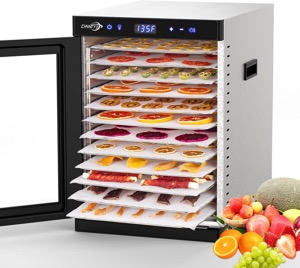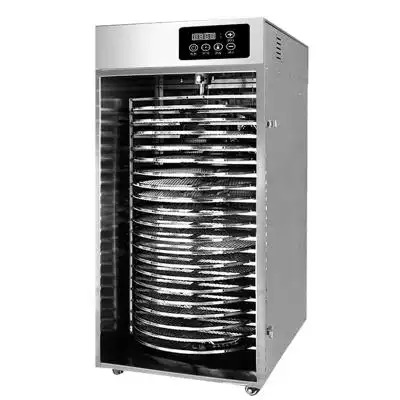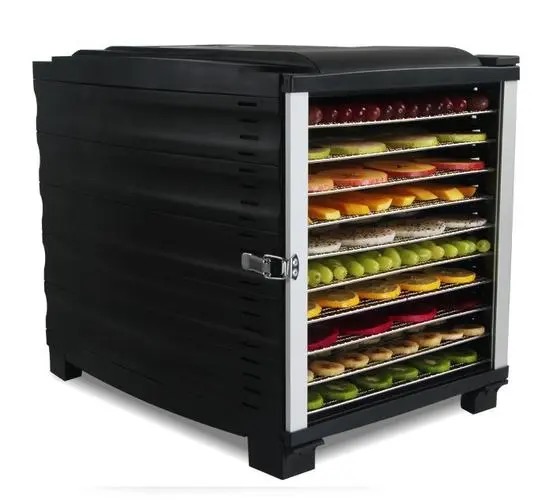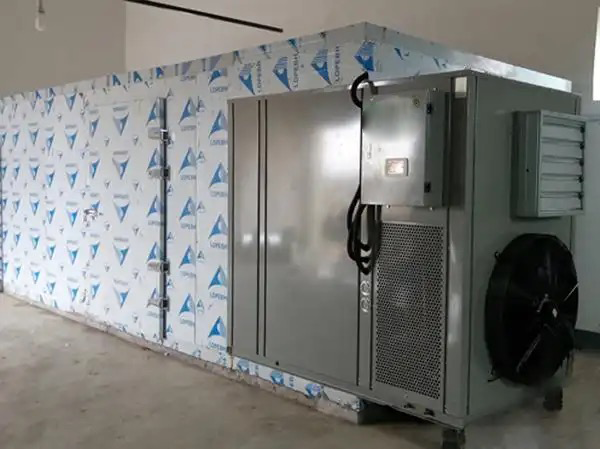
Content Menu
● Understanding Food Dehydration
● Types of Food Dryers
>> Heat Pump Dryers
>> Condenser Dryers
● Key Differences Between Heat Pump and Condenser Dryers
● Choosing the Right Dryer for Your Needs
● Additional Considerations for Food Drying
>> Quality of Dried Food
>> Environmental Impact
>> Noise Levels
>> Technological Innovations
● Practical Applications of Food Drying
● Conclusion
● FAQ
>> 1. What is the main difference between heat pump and condenser dryers?
>> 2. Are heat pump dryers worth the investment?
>> 3. Can I dry all types of food in both dryer types?
>> 4. How long does it take to dry food in each type of dryer?
>> 5. Which dryer is better for preserving nutrients?
When it comes to food preservation, drying is one of the oldest and most effective methods. In modern times, food dehydrators have evolved significantly, offering various technologies to cater to different drying needs. Among these technologies, heat pump dryers and condenser dryers are popular choices. This article will explore the benefits and drawbacks of both types, helping you decide which is best for your food drying needs.

Understanding Food Dehydration
Food dehydration is a process that removes moisture from food to prevent spoilage. By reducing the water content, the growth of bacteria, yeasts, and molds is inhibited, thus extending the shelf life of the food. Dehydrators work by circulating warm air around the food at low temperatures, typically between 95°F and 165°F (35°C to 74°C), allowing for a gentle drying process that preserves nutrients and flavors.
Types of Food Dryers
Heat Pump Dryers
Heat pump dryers utilize a closed-loop system that extracts moisture from food while maintaining a controlled environment. They operate similarly to reverse-cycle air conditioners, using a heat exchange system that absorbs heat from the air and transfers it to the drying chamber.
Advantages of Heat Pump Dryers:
- Energy Efficiency: Heat pump dryers use significantly less energy compared to traditional condenser dryers. They can save up to 70% in operating costs due to their efficient energy use.
- Gentle Drying: These dryers operate at lower temperatures, which helps preserve the color, shape, and nutritional content of food.
- Versatility: Heat pump dryers can handle a wide variety of foods including fruits, vegetables, meats, and herbs.
- Environmentally Friendly: By using ambient air as a heat source, they reduce reliance on fossil fuels and minimize emissions.
- Consistent Results: The controlled environment ensures uniform drying across all items in the dryer, preventing some pieces from becoming over-dried while others remain moist.
Condenser Dryers
Condenser dryers function by extracting moisture from food through a heating element that raises the temperature inside the drying chamber. The moisture-laden air is then cooled down in a condenser unit where water is collected.
Advantages of Condenser Dryers:
- Faster Drying Times: Because they operate at higher temperatures (typically between 140°F and 160°F or 60°C to 71°C), condenser dryers can dry food more quickly than heat pump models.
- High Capacity: Many condenser models come with larger capacities, making them suitable for bulk drying operations.
- Lower Initial Cost: Generally, condenser dryers are less expensive upfront compared to heat pump dryers.
- Simplicity of Use: Many users find condenser dryers easier to operate since they often come with straightforward controls and settings.
Key Differences Between Heat Pump and Condenser Dryers
| Feature | Heat Pump Dryer | Condenser Dryer |
| Energy Efficiency | High (saves up to 70%) | Moderate (higher energy consumption) |
| Operating Temperature | Lower (up to 140°F or 60°C) | Higher (up to 160°F or 71°C) |
| Drying Time | Longer | Shorter |
| Nutrient Preservation | Excellent (gentle drying) | Good (but can lose some nutrients) |
| Initial Cost | Higher | Lower |
| Versatility | Very versatile | Good but may be limited |
| Maintenance | Requires periodic servicing | Generally lower maintenance needs |
Choosing the Right Dryer for Your Needs
When deciding between a heat pump dryer and a condenser dryer for food dehydration, consider the following factors:
1. Energy Costs: If you are looking for an energy-efficient solution that minimizes operational costs over time, a heat pump dryer may be your best bet.
2. Drying Speed: If you need quick turnaround times for large batches of food, a condenser dryer might be more suitable.
3. Food Types: Consider what types of food you plan to dehydrate. If you want to preserve delicate items like herbs or fruits while maintaining their color and nutrients, a heat pump dryer is ideal.
4. Budget: Evaluate your initial investment versus long-term savings. While heat pump dryers are more expensive upfront, they can save money on energy bills in the long run.
5. Space Considerations: Ensure you have adequate space for installation and operation of your chosen dryer type.
6. User Experience: Some users prefer the simplicity of operation found in condenser dryers, whereas others may appreciate the advanced features offered by heat pump models.
7. Maintenance Requirements: Consider how much time you are willing to invest in maintenance. Heat pump dryers may require more attention due to their complex systems compared to simpler condenser units.

Additional Considerations for Food Drying
Quality of Dried Food
The quality of dried food can vary significantly based on the type of dryer used. Heat pump dryers tend to produce higher quality dried products because they operate at lower temperatures that help retain flavors and nutrients better than condenser dryers. Foods dried in heat pump units often have better texture and taste since they undergo a slower drying process that prevents cooking or over-drying.
Environmental Impact
As sustainability becomes increasingly important in consumer choices, it's worth noting that heat pump dryers are generally more environmentally friendly than condenser models. Their energy efficiency means less electricity consumption over time, which translates into reduced carbon footprints for users who prioritize eco-friendly practices.
Noise Levels
Another factor worth considering is noise levels during operation. Heat pump dryers tend to be quieter than condenser dryers due to their design and operational mechanisms. If noise is a concern—especially if you plan on using the dryer in a living area—a heat pump model may be more suitable for your needs.
Technological Innovations
Both types of dryers have seen advancements in technology that enhance their functionality:
- Smart Features: Some modern models come equipped with smart technology that allows users to monitor and control their drying processes through mobile apps or smart home systems.
- Programmable Settings: Many newer models offer programmable settings tailored for specific foods or desired moisture levels, making it easier for users to achieve perfect results every time.
Practical Applications of Food Drying
Food drying has numerous applications beyond just preservation:
- Snacking Options: Dried fruits and vegetables make healthy snacks that are easy to store and transport.
- Meal Preparation: Dried foods can be rehydrated for use in soups, stews, and other dishes, providing convenience for meal prep.
- Emergency Supplies: Dried foods are ideal for emergency preparedness kits as they have long shelf lives and require minimal storage space.
- Culinary Creativity: Chefs often use dried ingredients in gourmet dishes or as garnishes due to their concentrated flavors.
Conclusion
In summary, both heat pump dryers and condenser dryers have their advantages depending on your specific needs for food dehydration. For those prioritizing energy efficiency and nutrient preservation, heat pump dryers are an excellent choice. Alternatively, if speed and capacity are more critical factors for your operation, then condenser dryers may be more appropriate.
Ultimately, understanding your specific requirements—such as budget constraints, desired drying times, types of food being processed, and environmental considerations—will guide you toward making an informed decision about which type of dryer best suits your needs.

FAQ
1. What is the main difference between heat pump and condenser dryers?
The main difference lies in their operation; heat pump dryers use lower temperatures for energy-efficient drying while condenser dryers operate at higher temperatures for faster drying times.
2. Are heat pump dryers worth the investment?
Yes, while they may have a higher initial cost, their energy efficiency can lead to significant savings over time.
3. Can I dry all types of food in both dryer types?
Both types can handle various foods; however, heat pump dryers are better suited for delicate foods requiring gentle drying processes.
4. How long does it take to dry food in each type of dryer?
Heat pump dryers typically take longer due to lower temperatures compared to condenser dryers which dry food more quickly due to higher operating temperatures.
5. Which dryer is better for preserving nutrients?
Heat pump dryers are generally better at preserving nutrients due to their lower temperature operation during the drying process.












